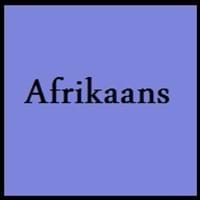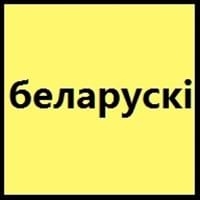Afrikaans vs Belarusian
Countries
South Africa
Belarus, Poland
National Language
South Africa
Belarus, Gambia
Second Language
Namibia, South Africa
Poland
Speaking Continents
Africa
Asia
Minority Language
Botswana, Lesotho, Malawi, Swaziland, Zambia, Zimbabwe
Czech Republic, Lithuania, Ukraine
Regulated By
Die Taalkommissie, National Languages Committee
National Academy of Sciences of Belarus, National Languages Committee
Interesting Facts
- Afrikaans Language is a mixture of English, Dutch, German, French and some South African language like Xhosa.
- Afrikaans Language lacks case and gender distinctions.
- Since 1918, Belarusian has been the official language of Belarus.
- Belarusian include many loanwords from Polish language.
Similar To
Dutch Language
Russian and Ukrainian
Derived From
Dutch Language
Not Available
Alphabets in
Afrikaans-Alphabets.jpg#200
Belarusian-Alphabets.jpg#200
Writing Direction
Left-To-Right, Horizontal
Not Available
Language Levels
Not Available
Time Taken to Learn
Not Available
How Are You?
Hoe gaan dit
Jak vy ?
Good Night
goeie nag
Dabranač
Good Evening
Goeienaand
Dobry viečar
Good Afternoon
Goeie middag
dobry dzień
Good Morning
goeie more
Dobraj ranicy
Please
asseblief
Kali laska
Bye
Not Available
da pabačennia
I Love You
Ek het jou lief
JA liubliu ciabie
Excuse Me
Verskoon my
Vybačajcie
Dialect 1
Kaapse Afrikaans
North-Eastern Belarusian
Where They Speak
Not Available
North-East Belarus
Dialect 2
Oranjeriverafrikaans
South-Western Belarusian
Where They Speak
Not Available
South-West Belarus
Dialect 3
Baster Afrikaans
Middle Belarusian
Where They Speak
Namibia
Middle Belarus
Speaking Population
Not Available
Native Name
Afrikaans
Беларуская мова (Bielaruskaja mova)
Alternative Names
Cape Dutch
Belarusan, Belorussian, Bielorussian, Byelorussian, White Russian, White Ruthenian
French Name
afrikaans
biélorusse
German Name
Afrikaans
Weißrussisch
Pronunciation
[ɐfriˈkɑːns]
Not Available
Ethnicity
Afrikaners
Belarusians
Origin
17th Century
18th century
Language Family
Indo-European Family
Indo-European Family
Early Forms
Cape dutch or kitchen dutch
Old East Slavic
Standard Forms
Standard Afrikaans
Belarusian
Language Position
Not Available
Signed Forms
Signed Afrikaans (signs of SASL)
Not Available
Scope
Individual
Individual
ISO 639 6
afrs
Not Available
Glottocode
afri1274
bela1254
Linguasphere
52-ACB-ba
53-AAA-eb < 53-AAA-e (varieties: 53-AAA-eba to 53-AAA-ebg)
Language Type
Living
Living
Language Linguistic Typology
Subject-Object-Verb
Not Available
Language Morphological Typology
Analytic
Not Available
Afrikaans and Belarusian Language History
Comparison of Afrikaans vs Belarusian language history gives us differences between origin of Afrikaans and Belarusian language. History of Afrikaans language states that this language originated in 17th Century whereas history of Belarusian language states that this language originated in 18th century. Family of the language also forms a part of history of that language. More on language families of these languages can be found out on Afrikaans and Belarusian Language History.
Afrikaans and Belarusian Greetings
People around the world use different languages to interact with each other. Even if we cannot communicate fluently in any language, it will always be beneficial to know about some of the common greetings or phrases from that language. This is where Afrikaans and Belarusian greetings helps you to understand basic phrases in Afrikaans and Belarusian language. Afrikaans word for "Hello" is hallo or Belarusian word for "Thank You" is Dziakuj. Find more of such common Afrikaans Greetings and Belarusian Greetings. These greetings will help you to be more confident when conversing with natives that speak these languages.
Afrikaans vs Belarusian Difficulty
The Afrikaans vs Belarusian difficulty level basically depends on the number of Afrikaans Alphabets and Belarusian Alphabets. Also the number of vowels and consonants in the language plays an important role in deciding the difficulty level of that language. The important points to be considered when we compare Afrikaans and Belarusian are the origin, speaking countries, language family, different greetings, speaking population of these languages. Want to know in Afrikaans and Belarusian, which language is harder to learn? Time required to learn Afrikaans is 24 weeks while to learn Belarusian time required is Not Available.





